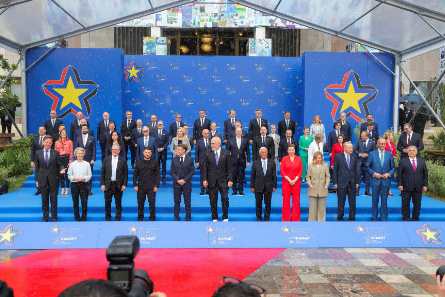On May 16, 2025, Tirana became the epicentre of European diplomacy as it hosted the sixth summit of the European Political Community (EPC), welcoming 47 European leaders and top officials of the European Union. This marked a historic first: Albania became the first Western Balkan country to host the EPC—a platform born from the French President Emmanuel Macron’s initiative in 2022 to unite European nations, both EU members and non-members, in strategic dialogue amid mounting security threats, particularly from Russia. This summit, held in the heart of Tirana at Skanderbeg Square, did not merely symbolize routine diplomatic protocol—it signified a deliberate and profound recognition of Albania’s rising geopolitical relevance. Once peripheral to European power politics, the small Western Balkan nation now finds itself playing host to continental conversations of the highest level.
Why Albania? A Calculated Geopolitical Choice
In a region marred by historical tensions and external influences, Albania has steadily positioned itself as a reliable ally to the West and an emerging stabilizing force. While countries like Serbia and North Macedonia were possible hosts, Albania was chosen—underscoring its consistent support for democratic values, regional peace, and Euro-Atlantic integration. Its performance in global institutions, including a temporary seat on the United Nations Security Council and leadership of the OSCE, further strengthened its credibility.
This ascent is not accidental. Tirana has, in recent years, transformed from an overlooked capital into a hub for European diplomacy. From October 2023 to May 2025, four major European summits were held in the Albanian capital:
- Berlin Process Summit (October 16, 2023);
- Ukraine-Southeast Europe Summit (February 28, 2024);
- EU-Western Balkans Summit (February 29, 2024);
- European Political Community Summit (May 16, 2025).
With NATO’s 2027 summit already scheduled for Tirana, Albania’s diplomatic calendar rivals that of Brussels or Vienna. In stark contrast, neighbouring capitals such as Skopje and Podgorica have hosted significantly fewer high-level gatherings.
Tangible Outcomes: Albania’s Four Strategic Gains
Albania’s investment in diplomatic visibility has yielded significant returns. The succession of summits, particularly the EPC gathering, has generated four concrete gains for the country:
- Substantial Development Funding: Between 2023 and 2025, Albania secured €922 million through EU mechanisms like the Berlin Process and the Growth Plan for the Western Balkans (2025–2027). These funds target sustainable development, connectivity, and economic convergence with EU standards.
- Increased Political Credibility: Tirana’s consistent hosting of high-level events has positioned Albania as a steadfast partner of the West—particularly valued amid growing concerns over Russian and Chinese influence in the Balkans. Albania is increasingly seen not only as a recipient of European policy but also as a contributor to its shaping.
- Strategic Counterbalance to Russian Influence: Through the EPC summit and its regional leadership, Albania plays an important symbolic and strategic role in resisting Russian-backed destabilization in the Balkans. It has become a point of democratic consolidation in an otherwise fragile neighbourhood.
- Integration into the EU’s Long-Term Vision: Albania has earned a spot in the EU’s broader vision for regional development—benefiting not only from current funding packages but also from structural reforms that accelerate full EU membership. The peaceful 2025 local elections further reinforced Albania’s democratic credentials.
A Voice for a New Europe
In a joint press statement with Danish Prime Minister Mette Frederiksen, Albania’s
Prime Minister Edi Rama highlighted the political and symbolic weight of the summit. “We gathered here—54 leaders, EU and non-EU alike—to have a sincere, strategic conversation about a new Europe in a new world,” he said. Rama emphasized that the summit reaffirmed Europe’s core values and demonstrated a unified will to defend them against modern threats. Frederiksen, who will host the next EPC summit in Copenhagen, expressed her admiration for Albania’s progress and underlined the importance of ensuring continuity in the EPC’s mission to preserve unity and resilience.
Tirana’s transformation from a quiet Balkan capital to a geopolitical meeting point reflects a broader shift in Europe’s understanding of its own geography and future. As EU enlargement reemerges on the agenda, the Western Balkans—long treated as a periphery—are being recognized as indispensable to Europe’s strategic depth and security. Albania, with its proactive diplomacy and unwavering Euro-Atlantic orientation, is no longer simply aspiring to join the European family. It is helping shape its future. In the words of Prime Minister Rama, Europe today is not just a continent—it is a collective mindset. And Albania, once on the margins of that mindset, now stands firmly at its core.
Written by our correspondent A.T.



